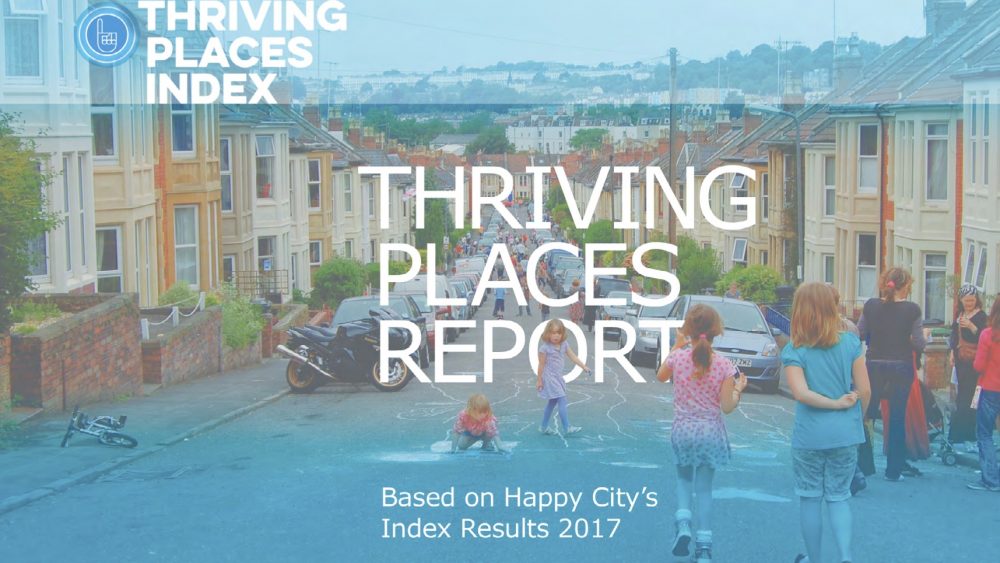A trailblazing report, launched today, has unlocked a new system to measure the conditions which enable people and places to thrive.
While experts across the globe continue to debate whether gross domestic product (GDP) is an overly simplistic and, in many cases, deeply misleading analysis of a nation’s success, it’s taken a charity in Bristol to come up with a viable alternative.
Step forward Happy City and their pioneering team of data analysts, who have been developing a methodology to measure the local conditions that most influence our wellbeing since 2011.
The Thriving Places Index is the most comprehensive analysis of how well local authorities are doing at creating the conditions for people to thrive ever undertaken. Data from 150 local authorities in England was assessed against three main categories – local conditions, sustainability and equality – supported by 48 separate indicators including health, education and work.
Liz Zeidler, founding director of Happy City, said: “We are ten years on from an economic crisis that highlighted fatal flaws at the heart of our economy, yet we haven’t seen the systemic changes needed to tackle them.
“Rising inequality and climate chaos are clear alarm bells that tell us the current system is no longer fit for purpose, so we decided to take matters into our own hands and come up with a model that measures what matters.
“The Index is a practical tool, that can be used right now, to help leaders who want to ensure the sum of their efforts – in every sector – is a better quality of life for people now and in the future.”
GDP’s failings came under fire just last month at the World Economic Forum, with economist Diane Coyle criticising its disregard for environmental impacts, while Oxfam published a report revealing that 82 per cent of all of the wealth created in 2017 – enough to end global poverty seven times over – went to the top one per cent.
The Thriving Places report is supported by Triodos Bank, a global pioneer in sustainable banking which only finances projects delivering positive social, environmental and cultural impacts.
Bevis Watts, Managing Director of Triodos Bank UK, said: “For too long, society has focused on the single measure of GDP, an outdated metric incapable of connecting our economy with social and environmental outcomes that determine our wellbeing and future prosperity. We cannot continue to measure success purely in terms of growth when our resources are finite.
“Our financial system underpins our current economic paradigm but at Triodos Bank, we believe finance can be a powerful force for positive change. To redirect our banks and the flow of money in the economy, we need greater transparency on how our money is used, to understand its impact and to know where to direct it in order to create the conditions for people to thrive.
“The Thriving Places Index gives us a clear picture, for the first time, of the places most in need of investment, pointing the way towards a more sustainable and inclusive economy – one that has a true sense of value.”
The report argues that truly thriving places require investment in a range of areas, including mental and physical health, work and the local economy, education and learning opportunities, the qualities of the place and its environment, and the connections between people and community.
One local authority that has embraced the methodology is Birmingham. Karen Creavin, who leads wellbeing services for Birmingham City Council, commented: “There are 1.1m citizens in Birmingham of which 408,000 – almost half – are in the top 10% poorest households in the country. This presents huge challenges in terms of inequalities, income, life expectancy and health, but it also means there is huge potential for change. The Thriving Places Index is a huge step forward in being able to measure whether our work is having an impact, and what we need to rethink to really improve the lives of citizens.”
Overall, the index reveals both a North-South divide and some stark urban-rural differences. All 11 local authorities with the lowest scores for local conditions are urban. From a regional perspective, the North East is the lowest performing for local conditions and sustainability, as well as the second lowest for equality.
Three local authorities in the South East of England – Wokingham, Buckinghamshire and Surrey – top the table for local conditions. London boroughs Tower Hamlets, Newham and Luton form the top three for sustainability, in part due to their low levels of energy consumption and above average recycling rates, while Harrow and Lambeth scored highly for equality.
However, Bath & North East Somerset is the highest scoring local authority overall as the only area to achieve an above average score for all three main indicators.
Happy City is calling on other local authorities to embed the Thriving Places Index in their own systems of measurement and use it to benchmark progress and encourage greater collaboration.
Steps to Success
Happy City aims to support as many local areas across the UK as possible to use this index to:
- Act as a new compass and a shared roadmap for all sectors to work together to deliver real ‘prosperity’ for all.
- Test out innovative policies and actions to improve local conditions for local people.
- Put the wellbeing of citizens now and in the future at the heart of how they measure and define ‘success’.



Comments are closed.